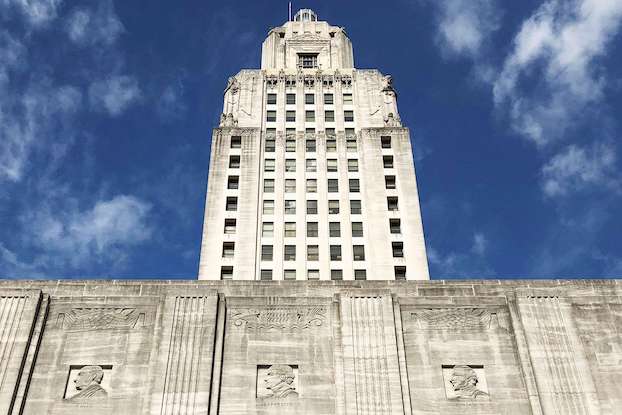Gas pains: Area business owners feeling pinch at pump
Published 5:24 pm Tuesday, March 15, 2022

- Rising fuel costs are affecting consumers as well as business owners. (Metro Creative Services)
The cost of doing business means small local business owners are making some tough decisions … again. Southwest Louisiana residents are worried. Many drive into Lake Charles from small rural communities, not only in Calcasieu Parish, but also Beauregard, Jeff Davis and Allen. Some drive an hour or more to work at LNG plants in Cameron Parish. They want to know if fuel prices will ever come down again, and how did this happen?
“The cost of fuel is definitely affecting our business and the industry as a whole,” said Jeff Coates, Home Building Materials in Sulphur. “It’s a double one-two punch for us. First it was COVID affecting lumber prices and what’s going on at the mills, and now shipping and delivery prices are up.”
Coates said delivery prices, which he described as lower than his competitors, would have to be adjusted.
“We’re going to have to increase our prices a little,” he said. “We’re not going to get to their level and we’re going to show it as an added charge so we can take it away when the time comes.”
Lake City Trucking has 50 trucks in its fleet. Some of the over-the-road routes have a fuel surcharge matrix in place, but prices will need to be adjusted for short-hauls.
Across the globe
Local economist Loren Scott explained the rising fuel prices as follows.
“What is going on at the pump is solely due to what is happening to the price of oil,” he wrote in an email to the American Press.
Every time the price of oil goes up $1, the price of gasoline goes up about four to five cents with a bit of a lag because it takes time for the higher priced oil to get to the refinery and be made into the then higher priced gasoline, according to Scott. He said the bad news is, the price of oil has jumped about $25 in the last eight to 10 days.
“That means we are looking at another bump in gasoline and this was before Biden’s ban,” Scott said.
Local economist and McNeese Professor Dan Groft agrees. Gasoline will go up again.
Scott says the price of oil has risen so much because of what Putin is doing in Ukraine.
“Just the threat of him invading concerned the market because Russia produces about 10 percent of the world’s output. Initially prices rose from about $80 a barrel to $95 because there was just the threat of the invasion. The reason why a relatively small change in oil supply can cause a large change in the price of oil is because the demand curve for oil is very steep–an economist would call it inelastic because small changes in supply lead to large changes in price.”
Only about 8% of U.S. crude and petroleum comes from Russia. The country provides roughly 30% of the European Union’s crude and almost 40% of its gasoline. The price of gas in the US can’t be disentangled from what’s happening to global markets, experts say.
Jack Marcantel co-owns one convenience store in a small rural community. Last week he received a call from his wholesaler telling him that diesel was going up 50 cents a gallon.
“Fuel isn’t marked up in the same way you mark up a bag of chips,” said Marcantel. “We get pennies per gallon and we pay for it as soon as it’s put in the ground.”
Marcantel said he is no economist, but the year after Biden took office, his fuel cost almost doubled. He pulled his receipts.
“Gas was $1.76 on November 2, 2020” he said. “A year later, it was $3.13.”
“We’re a small operation here and I feel for local businesses, for instance imagine if you have a logging business. Everything you use to operate that business runs on diesel,” he said.
Marcantel understands the cost of crude affects fuel costs. However, he believes that Biden’s energy policies and greenhouse gas pollution reduction goals have also contributed.
Net zero by 2050
U.S. Sen. Bill Cassidy, M.D. has voiced his disagreement with shutting down energy production in the United States.
“American families are paying higher prices for the goods and services that they can’t do without as a result of the Biden administration,” he said in a speech on the Senate Floor in September 2021.
“Inflation is eating up the budgets of middle-income families. President Biden has repeatedly said he would ot raise taxes on those making less than $40,000 a year. But rising inflation as a result of his harmful economic and energy agenda is a tax on all Americans.”
Cassidy pointed out that gasoline prices were up 45 percent during the summer of 2021. He stressed encouraging exploration and production at home. He concluded with, “The Biden administration needs to restart American energy production. Hold lease sales in the Gulf of Mexico. Get American energy and our country back on track.”
In February 2022, during a Senate Energy and Natural Resources Committee, it was pointed out that blocking U.S. energy lease sales might actually increase global greenhouse gas emissions due to the emissions created in the production and transportation of foreign energy to the U.S.
“We now have the highest inflation in 40 years….Russia has leverage in the EU. We have higher energy prices because this administration has kind of led an effort to limit production and development of North American resources…. We have gone within a year from being energy independent to groveling before OPEC to ask them to increase world supply because our gasoline prices have gone up so much…..”
Wall Street
A March 10 Time magazine article by Justin Worland/Houston has a different take on why industry isn’t ramping up production.
“Getting more oil flowing requires capital and comes with high risks in a volatile oil market,” Worland writes. ‘With steep losses in recent memory, the investors who control the purse strings are keeping the companies on a tight leash. Ultimately, companies have to make a decision to risk their capital… Nobody knows how this episode is going to play out,’ Mark Viviano, managing partner at Kimmeridge, a private equity firm focused on oil and gas, told a packed conference room on March 8. ‘I don’t think it’s realistic to think there’s going to be a collective industry response to this crisis. Unfortunately, it’s just not the way the industry is.’
For those that assume a rise in prices will mean more drilling, it may not happen. “After the industry suffered huge losses in the years leading up to the COVID-19 pandemic, investors continue to prioritize safe profits. And even though the Biden administration has enacted few climate regwulations restricting oil and gas, industry leaders say they continue to feel the climate pressure from investors,” according “The Real Reason Big Oil Won’t Save the U.S. from High Gas Prices.”
According to a 10/12 Industry Report on Tuesday, Feb. 22, which was based on a Wall Street Journal story earlier in the week, America’s largest frackers are reporting huge profits but plan to keep oil production in low gear this year, adhering to an agreement with Wall Street, even as prices approach the $100-a-barrel mark for the first time since 2014.
Three of the largest shale companies, Pioneer Natural Resources Co., Devon Energy Corp. and Continental Resources Inc., this week reported their highest annual profits in more than a decade for 2021.
The companies said they collected record amounts of extra cash by hanging on to the money they earn selling oil and natural gas and reinvesting only what they needed to keep output roughly flat. All three said they would continue to limit production growth this year.
Relief?
In an online article, “When Will Gas Prices Go Down? Experts Say a Dip Beneath $4 Won’t Happen Soon” (international conflict aside) suggests prices won’t come down until later this year.
The current administration has warned that gas prices will “go up further” from their current record levels. He continues to show his support for government spending on renewable energy sources, and he has criticized the oil and gas industry for not taking full advantage of drilling opportunities in the U.S.
Capital discipline due to market uncertainties, and the lag between obtaining permits and producing oil, if drilling is successful, could be holding back production. However, federal courts have presented a problem for oil and gas producers, and more uncertainty. After the Biden administration held the largest lease sale in the United States history, a federal judge canceled oil and gas leases of more than 80 million acres in the Gulf of Mexico, ruling that the Biden administration did not sufficiently take climate change into account when it auctioned the leases late last year.
Cassidy has outlined a four-pronged approach for the U.S. to achieve its energy, national security, economic and climate goals that includes investing in U.S. energy production and cutting bureaucratic red-tape, stock-piling fuels and critical minerals.
For now…
There are people who are commuting to jobs that may pay as little as $10 an hour. For them, the cost of gasoline has gone from laughing at a funny social media meme to concern for how they’ll manage to keep working. An electric car is not in the budget, and neither is a fossil fuel powered car. Food and utilities are a primary concern, maybe the note for a vehicle that is now less expensive than the monthly expense of filling its tank.
Here are a few tips that might offer savings.
– Find the nearest gas with the best price with the GasBuddy, AAA apps.
– Fill up at name brand chains that offer discounted gas.
– Pay cash at the pump.
– Use a credit card or gas rewards credit card to save. (Credit cards that offer discounts for gas purchases might not be the best option if the balance isn’t paid off each month.)
– Stay at half a tank, which can ease the stress and offer flexibility about where gas is purchased.
– Minimize travel, organize runs
– Obey speed limits and drive evenly avoiding hard acceleration and braking
– Skip the premium but do buy Top Tier gas
– Check tire pressure. Tires lose about 1 psi per month.





